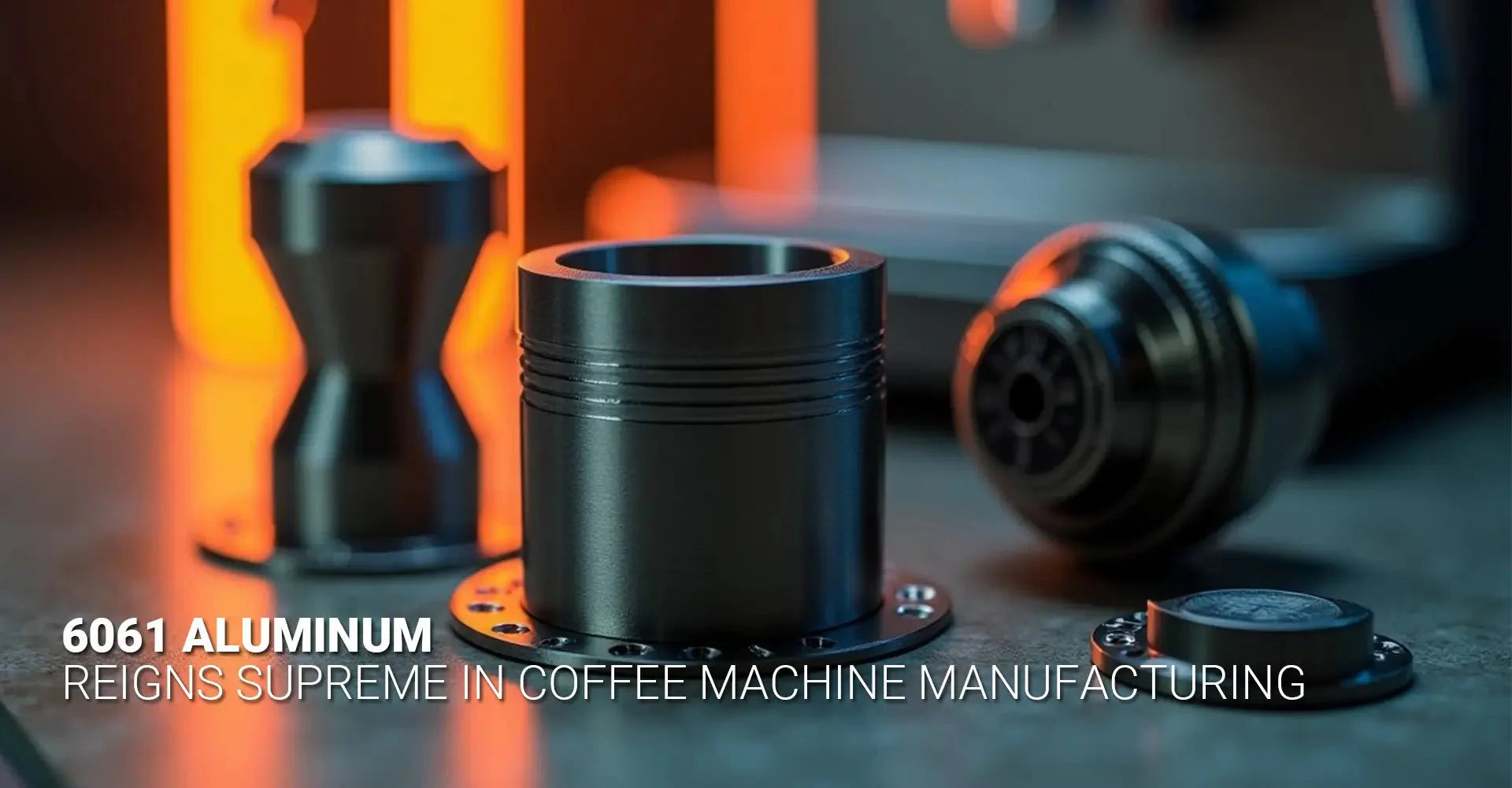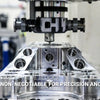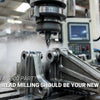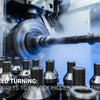Why 6061 Aluminum Reigns Supreme in Coffee Machine Manufacturing: FDA-Approved Strength, Corrosion Resistance, and Cost Efficiency

Why 6061 Aluminum Reigns Supreme in Coffee Machine Manufacturing: FDA-Approved Strength, Corrosion Resistance, and Cost Efficiency

In the competitive world of coffee equipment manufacturing, material selection plays a crucial role in determining product quality, longevity, and performance. While casual consumers might focus on features and aesthetics, industry professionals understand that material selection critically determines durability, performance, and safety. 6061 aluminum has quietly become the backbone of premium coffee equipment manufacturing, combining strength, compliance, and cost advantages that other materials simply cannot match.
6061 aluminum offers an unbeatable combination of 45 ksi tensile strength in T6 temper, FDA compliance through proper anodization, and 65% lower machining costs compared to stainless steel. With thermal conductivity ten times higher than stainless steel (167 W/m·K vs 16 W/m·K), it enables faster heating and more precise temperature control—critical factors for consistent extraction and crema quality.
Understanding 6061 aluminum's specific advantages helps manufacturers and purchasers make informed decisions about coffee equipment components. This comprehensive guide explores the material properties, compliance standards, cost considerations, manufacturing techniques, and sustainability benefits that make 6061 aluminum the preferred choice for quality coffee machines.
Table of Contents
- What Makes 6061 Aluminum Mechanically Ideal for Coffee Machine Components?
- How Does Anodized 6061 Aluminum Meet FDA and Global Food Safety Standards?
- Why Does 6061 Aluminum Provide Better Value Than Stainless Steel and Plastics?
- What Precision Advantages Does CNC Machining Offer for 6061 Aluminum Coffee Components?
- How Does 6061 Aluminum Support Sustainability Goals in Coffee Equipment Manufacturing?
- Conclusion
What Makes 6061 Aluminum Mechanically Ideal for Coffee Machine Components?
Coffee machines undergo significant stress during operation—from high-pressure brewing (9-15 bars) to thermal cycling and vibration from pumps and grinders. 6061 aluminum, particularly in its T6 temper, provides exceptional mechanical stability under these demanding conditions. With a tensile strength of 45 ksi compared to just 19 ksi in its untreated state, T6-tempered components resist deformation even after thousands of brewing cycles.
The material's excellent strength-to-weight ratio translates to lighter yet robust machines. A typical commercial espresso machine using 6061 aluminum components weighs 40% less than equivalent stainless steel models, reducing counter stress and shipping costs while maintaining durability through 1,500+ hours of salt spray test resistance—perfect for environments with constant moisture exposure.
Beyond basic strength, 6061 aluminum's fatigue resistance stands out in coffee applications. Testing shows that properly machined 6061-T6 components can withstand over 500,000 pressure cycles without structural compromise—equivalent to approximately 10 years of commercial use. This reliability comes from the material's unique combination of manganese and silicon alloying elements, which create strengthening precipitates during the heat treatment process. Additionally, its thermal expansion coefficient of 23.6 µm/m·K allows for precise engineering of components that must maintain tight tolerances despite temperature fluctuations between ambient and brewing temperatures.
How Does Anodized 6061 Aluminum Meet FDA and Global Food Safety Standards?
Food safety remains paramount in coffee equipment design. Unfinished aluminum can potentially leach into acidic foods and beverages, raising legitimate concerns about its use in coffee machines. However, properly anodized 6061 aluminum creates a non-reactive surface that fully complies with FDA 21 CFR 175.300 regulations for food contact materials, addressing these concerns completely.
The anodization process creates a hard oxide layer (typically 20µm thick) that seals the aluminum surface, preventing direct contact between coffee and raw aluminum. This surface finish achieves an impressive smoothness rating of Ra ≤0.4µm, which significantly inhibits bacterial adhesion and resists coffee oil buildup. Case studies demonstrate that electropolished 6061 parts reduce microbial retention by 63% compared to cast aluminum alternatives.

Beyond FDA compliance, anodized 6061 components meet stringent global standards including NSF/ANSI 51 in the US and EN 1672-1 in the European Union. The anodizing process also permits custom colors without compromising food safety, allowing manufacturers to maintain brand aesthetics while ensuring compliance. Testing protocols typically involve 30-day coffee exposure tests, measuring zero detectable aluminum migration at brewing temperatures and pressures. For extra protection, Type III (hard) anodizing provides additional wear resistance for components subject to mechanical friction, such as grinder burr housings and adjustment mechanisms.
Why Does 6061 Aluminum Provide Better Value Than Stainless Steel and Plastics?
Material selection inevitably involves cost considerations. 6061 aluminum stands out in comprehensive cost-benefit analysis against traditional alternatives like stainless steel and engineering plastics, particularly when factoring in lifecycle performance rather than just raw material costs.
Direct comparison reveals 6061 aluminum's clear advantages: machining costs of $0.75/cm³ versus $2.70/cm³ for stainless steel, thermal conductivity of 167 W/m·K compared to stainless steel's 16 W/m·K, and a weight of just 2.7 g/cm³ versus 8.0 g/cm³ for stainless. While engineering plastics may cost slightly less at $0.50/cm³, their poor thermal properties and shorter lifespan make them unsuitable for critical coffee equipment components.
The cost advantages extend well beyond initial manufacturing. Coffee machines using 6061 aluminum components typically demonstrate 30% faster heating times due to superior thermal conductivity, resulting in energy savings estimated at $45-60 annually per commercial machine. The reduced weight cuts shipping costs by an average of $8-12 per unit in large-scale distribution. While stainless steel offers comparable longevity, properly anodized 6061 aluminum maintains its performance for 8-10 years in commercial settings—nearly identical to stainless at significantly lower cost. Additionally, repair costs through welding and re-anodizing restore functionality for approximately 30% the cost of replacement, enhancing lifetime value.
What Precision Advantages Does CNC Machining Offer for 6061 Aluminum Coffee Components?
The manufacturability of a material directly impacts component quality and consistency. 6061 aluminum excels in CNC machining processes, allowing for precision engineering that enhances both performance and production efficiency of coffee machine parts.
Modern 5-axis CNC machining achieves remarkable tolerances of ±0.005mm for complex components like portafilters and steam wand nozzles—precision that directly translates to better brewing consistency and extraction quality. High-volume production capabilities exceed 500,000 units monthly with minimal material waste through AI-optimized nesting algorithms, making 6061 aluminum ideal for both boutique manufacturers and large-scale production.

The machinability index of 6061 aluminum (rated at 90%) significantly outperforms stainless steel (45%), allowing faster cutting speeds and reduced tool wear. This translates to 40% shorter production times and lower manufacturing costs. Surface treatments following machining further enhance component performance—anodizing at 20μm thickness improves wear resistance by 300-400%, while specialized ceramic-infused anodizing processes can create hydrophobic surfaces with contact angles exceeding 110°, preventing coffee oils from adhering to critical components like group heads. Advanced manufacturing techniques like ultrasonic vibration-assisted machining can achieve mirror finishes (Ra < 0.1μm) on internal water passages, reducing scale buildup and extending maintenance intervals.
How Does 6061 Aluminum Support Sustainability Goals in Coffee Equipment Manufacturing?
Environmental impact increasingly influences material selection decisions. The coffee industry's growing focus on sustainability makes 6061 aluminum's environmental credentials particularly relevant for forward-thinking manufacturers and environmentally conscious consumers.
6061 aluminum's 100% recyclability reduces carbon footprint by an impressive 95% compared to using virgin material. Its relatively low melting point of 582°C cuts energy consumption by 40% during manufacturing compared to stainless steel machining. These properties align perfectly with the specialty coffee industry's emphasis on environmental responsibility throughout the supply chain.

The sustainability advantages extend throughout the product lifecycle. Recycled 6061 aluminum retains 100% of its material properties, unlike many plastics that degrade during recycling. Manufacturing scrap has significant value, with 90% typically being reused in new production cycles. Forward-thinking coffee equipment manufacturers implement closed-loop recycling programs, where spent or damaged parts are collected, reprocessed, and incorporated into new components. The energy savings from recycling rather than producing virgin aluminum could power approximately 18.5 million U.S. households for a year. Additionally, lightweight aluminum components reduce transportation emissions throughout distribution—a medium-sized coffee machine manufacturer shipping 10,000 units annually can reduce their carbon footprint by approximately 18-24 metric tons CO₂ by switching from stainless steel to aluminum components.
Conclusion
The selection of 6061 aluminum for coffee machine components represents more than a simple material choice—it reflects a comprehensive understanding of performance requirements, safety standards, manufacturing constraints, and sustainability goals.
From its superior strength-to-weight ratio and thermal conductivity to its FDA compliance through proper anodization, 6061 aluminum delivers tangible benefits throughout the coffee equipment lifecycle. The material's excellent machinability enables precision manufacturing at scale, while its recyclability supports environmental objectives. For manufacturers seeking to balance performance, compliance, cost, and sustainability, 6061 aluminum consistently proves itself the optimal choice for quality coffee machine components. As coffee equipment continues to evolve, this versatile alloy will likely remain at the forefront of innovation in the industry.
External Links
[FDA and Global Food Safety Standards][^1]
[6061 Aluminum][^2]
[Sustainability in Manufacturing][^3]
---
[^1]: Understanding these standards is crucial for compliance and ensuring product safety in the food industry.
[^2]: Exploring the properties of 6061 Aluminum can enhance your knowledge of materials used in manufacturing processes.
[^3]: Learning about sustainable practices can help businesses reduce their environmental impact and improve efficiency.
-
Posted in
5 Axis CNC Machining





